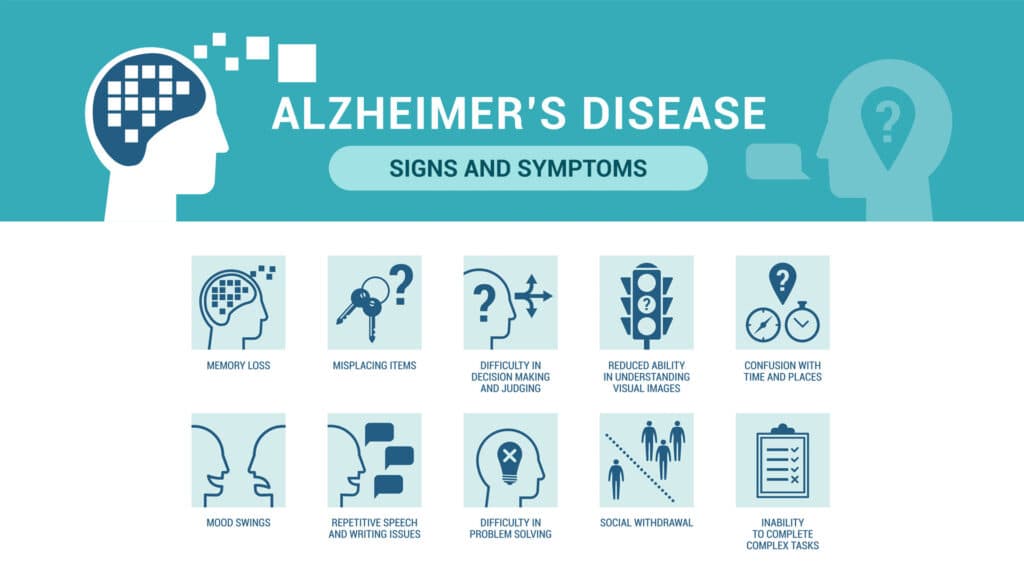Understanding Different Types of Dementia: Symptoms, Diagnosis, and Care
Dementia affects memory, thinking, and behavior. This article breaks down the main types of dementia, their symptoms, causes, and differences….

Dementia affects memory, thinking, and behavior. This article breaks down the main types of dementia, their symptoms, causes, and differences.
Dementia Key Highlights
Alzheimer’s disease is the most prevalent type of dementia, typically starting with memory loss and leading to significant cognitive decline; early detection through cerebrospinal fluid and blood tests is crucial for management.
Vascular dementia arises from impaired blood flow to the brain, often linked to cardiovascular issues; managing risk factors is essential to slow progression as no cure exists.
Frontotemporal dementia presents with personality changes and communication difficulties, and its diagnosis can be complex due to symptom overlap with other dementia types; early and precise diagnosis is vital for effective management.
Alzheimer’s Disease

Alzheimer’s disease is the most common type of dementia, affecting millions globally. This brain disorder primarily impacts memory and cognitive functions, gradually leading to severe disorientation and difficulty with basic tasks. In many cases, the initial symptom is memory loss, which progresses to more significant cognitive impairments. Interestingly, more than 80% of posterior cortical atrophy cases are linked to an atypical form of Alzheimer’s disease, highlighting its diverse manifestations.
Detecting Alzheimer’s disease early can make a significant difference in management. Cerebrospinal fluid tests reveal biomarkers linked to Alzheimer’s, helping in its detection. Additionally, blood tests are being researched as non-invasive tools to identify these biomarkers, potentially revolutionizing early diagnosis.
These diagnostic methods enable earlier interventions, potentially slowing progression and enhancing quality of life.
Vascular Dementia
Vascular dementia is another common type of dementia, often resulting from cardiovascular diseases. This condition arises when blood flow to the brain is impaired, leading to cognitive decline and affecting thinking skills and daily decision-making. High blood pressure and other cardiovascular issues are significant risk factors, underscoring the importance of maintaining cardiovascular health to prevent or slow the onset of this form of dementia.
Individuals with vascular dementia often have a shorter life expectancy due to related cardiovascular conditions. Diagnosing vascular dementia typically involves cognitive tests and brain imaging, which help identify the extent of brain damage and guide treatment plans.
Although there is no cure, managing cardiovascular risk factors can help mitigate the progression of dementia symptoms.
Lewy Body Dementia
Lewy body dementia is characterized by the presence of Lewy bodies in the brain and includes two forms: dementia with Lewy bodies and Parkinson’s disease dementia. This condition often presents with visual hallucinations early in the disease, which are typically realistic and detailed, making them a distinctive symptom. Cognitive fluctuations are also common, causing unpredictable changes in mental functioning that can impact attention and alertness.
Mood changes, such as depression and anxiety, are prevalent in individuals with Lewy body dementia, affecting their overall well-being. Sleep disturbances, including REM sleep behavior disorder where individuals act out their dreams, further complicate their condition. These symptoms collectively contribute to a challenging and often distressing experience for both patients and caregivers.
The average life expectancy after a diagnosis of Lewy body dementia ranges from two to twenty years, with most experiencing a decline over five to seven years. Despite the absence of a cure, understanding and managing symptoms through medication and supportive therapies can significantly improve the quality of life for those affected.
Frontotemporal Dementia

Frontotemporal dementia primarily affects neurons in the frontal and temporal lobes, leading to atrophy in these areas as the neurons die. This type of dementia manifests in various ways, including unusual behaviors, emotional disturbances, and difficulties with communication and movement. Behavioral variant frontotemporal dementia is notable for significant changes in personality and behavior, such as impulsivity and lack of empathy.
Primary progressive aphasia is another variant of frontotemporal dementia that affects language abilities, leading to difficulties in speaking, reading, and understanding. Additionally, diseases associated with frontotemporal dementia, such as corticobasal syndrome, can cause significant movement issues like apraxia and movement control difficulties. Genetic factors also play a role, with specific genes linked to familial forms of the disorder.
Frontotemporal dementia can be challenging to diagnose accurately due to overlapping symptoms with Alzheimer’s disease and mood disorders. Early and precise diagnosis is essential for effective management and support, emphasizing the need for awareness and understanding of this dementia type.
Mixed Dementia
Mixed dementia refers to a condition where a person experiences symptoms of more than one type of dementia, making its diagnosis and management particularly complex. This often involves a combination of Alzheimer’s disease and vascular dementia, leading to a range of symptoms from memory loss to behavioral shifts and difficulties with daily tasks. Cognitive tests and brain imaging are crucial in diagnosing mixed dementia, helping to identify issues associated with multiple dementia types.
While there is no cure for mixed dementia, certain medications can help manage symptoms and slow progression. Understanding the intricacies of mixed dementia is vital for providing appropriate care and support, ensuring that individuals receive the most effective interventions tailored to their unique needs.
Young Onset Dementia
Young onset dementia, diagnosed in individuals under 65, affects over 70,800 people in the UK. Unlike older individuals, those with young onset dementia may not experience memory loss as their initial symptom. Instead, they often face challenges with movement, coordination, and balance. Initial symptoms might involve memory challenges, difficulty concentrating, and trouble completing familiar tasks.
Frontotemporal dementia is common among younger individuals, with symptoms typically appearing between ages 45 to 64. The impact of young onset dementia extends beyond the individual, affecting family dynamics, relationships, and daily life. Recognizing these unique challenges is key to offering effective support and care.
Posterior Cortical Atrophy
Posterior cortical atrophy primarily affects brain cells in the rear section of the brain, which is essential for processing visual and spatial information. Individuals with this condition often face challenges with reading, distance judgment, and recognizing objects or familiar faces. Although it is linked to Alzheimer’s disease, posterior cortical atrophy presents differently, making its diagnosis and management unique.
Recognizing the specific symptoms and effects of posterior cortical atrophy is vital for providing suitable care and support. This includes tailored interventions that address the visual and spatial processing difficulties experienced by those affected.
Alcohol Related Dementia
Alcohol-related dementia is linked to chronic alcohol abuse and conditions like Wernicke-Korsakoff syndrome. This syndrome, often caused by vitamin B1 deficiency, presents with symptoms such as confusion, memory problems, and coordination issues. Excessive alcohol consumption can lead to significant brain health deterioration, increasing the risk of various types of dementia, including alcoholic dementia.
Recovery from Wernicke-Korsakoff syndrome varies; some patients fully recover, while others may require ongoing support or long-term care. Recognizing the link between alcohol abuse and dementia is key for prevention and effective management.
Huntington’s Disease
Huntington’s disease is a hereditary disorder that leads to both motor and cognitive decline, typically manifesting between ages 30 and 50. The disease progresses through stages, with initial symptoms often related to movement difficulties followed by changes in behavior and cognitive impairment. Currently, there is no cure for Huntington’s disease, and it typically results in death within two decades of symptom onset, although symptom management options exist.
Genetic factors contribute to about 10% of cases of young-onset dementia, increasing concerns for family members regarding their own risks. Recognizing the hereditary nature and progression of Huntington’s disease is vital for offering proper care and support to affected individuals and their families.
Common Symptoms of Dementia

Dementia symptoms can vary significantly based on the area of the brain affected. Common symptoms include memory loss, which is particularly prominent in Alzheimer’s disease, the leading cause of dementia. People may struggle to follow conversations or recall specific words, especially in the early stages. Mood fluctuations, such as increased emotional sensitivity or withdrawal, are also common.
Confusion regarding time and place is often observed as a symptom of dementia. Patients with frontotemporal dementia may face challenges in work-related tasks like organization and planning due to their cognitive decline. Symptoms of posterior cortical atrophy may include anxiety, confusion, and alterations in personality, which tend to worsen gradually over time.
Recognizing these common early symptoms aids in early detection and intervention, potentially improving outcomes for those with dementia.
Diagnosing Dementia
Diagnosing dementia involves a comprehensive approach that includes a patient’s medical history, cognitive assessments, neurological exams, and brain imaging techniques. Cognitive tests, which can be brief or complex, are used to evaluate a person’s memory, thinking, and problem-solving capabilities. Brain imaging, such as MRI or CT scans, is primarily utilized to exclude other medical conditions that might mimic dementia symptoms.
Diagnosis of Lewy body dementia can be particularly challenging due to symptom overlap with Alzheimer’s disease, requiring careful assessment by medical professionals. Timely and accurate diagnosis is essential for effective management and support.
Treatment and Care Options
While there is no cure for most types of dementia, various treatment options focus on managing symptoms and improving quality of life. For instance, treatment options for Lewy body dementia may include medications that target cognitive symptoms, but no cure currently exists. Treatments for frontotemporal dementia also focus on managing symptoms, given the lack of options to slow its progression.
Non-medication therapies, such as occupational therapy, music therapy, and pet therapy, can significantly enhance the well-being of individuals with dementia. Exercise is also beneficial, enhancing physical health and potentially slowing cognitive decline. Efforts to lower systolic blood pressure may help reduce the risk of cognitive decline, although evidence varies regarding the effectiveness of different interventions.
Summary
Understanding the various types of dementia, their symptoms, diagnosis, and care options is essential for providing effective support to those affected. From the common Alzheimer’s disease to the rarer forms like posterior cortical atrophy and Huntington’s disease, each type of dementia presents unique challenges that require tailored interventions.
By recognizing the signs and seeking early diagnosis, we can improve the quality of life for individuals with dementia and their families. Knowledge is power, and with the right information, we can navigate the complexities of dementia with greater confidence and compassion.
Frequently Asked Questions
What is the most common cause of dementia?
The most common cause of dementia is Alzheimer’s disease, which accounts for 60-80% of all cases. This prevalent condition significantly impacts cognitive function and quality of life.
How is dementia diagnosed?
Dementia is diagnosed through a comprehensive evaluation that includes the patient’s medical history, cognitive assessments, neurological examinations, and brain imaging techniques. This thorough process ensures an accurate diagnosis to guide effective treatment.
Can young people get dementia?
Yes, young people can indeed develop dementia, specifically referred to as young onset dementia, which occurs in individuals under the age of 65.
Is there a cure for dementia?
There is no cure for most types of dementia, but treatments are available to help manage symptoms and enhance quality of life.
What are the common symptoms of dementia?
Common symptoms of dementia are memory loss, confusion, mood changes, and challenges in performing daily activities. Recognizing these signs early can be crucial for timely intervention.







